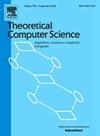An automata-based approach for addressing erroneous behaviors and deadlocks in component-based systems
IF 0.9
4区 计算机科学
Q3 COMPUTER SCIENCE, THEORY & METHODS
引用次数: 0
Abstract
In component-based modeling, a system is built by constructing several coordinating components. In turn, the communication principles among components are modeled by architectures that characterize the permissible interactions and the topology of the components. Several architectures impose also order restrictions to the appearance of the permissible interactions. The application of an architecture to a component-based system does not guarantee that the behaviors of the system meet all the requirements of the architecture. In turn, this can lead the system to actions that do not follow the intended order of the interactions, which we call erroneous behaviors. In this paper, we tackle the problem of such order violations by introducing a formal framework for building component-based systems that avoid erroneous behaviors. For this, we formalize the systems by nondeterministic finite automata and we model their architecture by a fragment of extended propositional interaction logic. This logic achieves to encode the order restrictions in the occurrence of the permissible interactions of the architecture. Given a component-based system with an architecture, we propose an automata-based method for constructing a respective system without erroneous behaviors. Our algorithm returns a system that is also free of deadlocks, meaning that the system does not reach states from which it can no longer progress.
求助全文
约1分钟内获得全文
求助全文
来源期刊

Theoretical Computer Science
工程技术-计算机:理论方法
CiteScore
2.60
自引率
18.20%
发文量
471
审稿时长
12.6 months
期刊介绍:
Theoretical Computer Science is mathematical and abstract in spirit, but it derives its motivation from practical and everyday computation. Its aim is to understand the nature of computation and, as a consequence of this understanding, provide more efficient methodologies. All papers introducing or studying mathematical, logic and formal concepts and methods are welcome, provided that their motivation is clearly drawn from the field of computing.
 求助内容:
求助内容: 应助结果提醒方式:
应助结果提醒方式:


